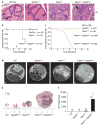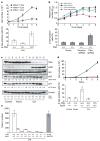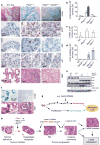Crucial role of p53-dependent cellular senescence in suppression of Pten-deficient tumorigenesis
- PMID: 16079851
- PMCID: PMC1939938
- DOI: 10.1038/nature03918
Crucial role of p53-dependent cellular senescence in suppression of Pten-deficient tumorigenesis
Abstract
Cellular senescence has been theorized to oppose neoplastic transformation triggered by activation of oncogenic pathways in vitro, but the relevance of senescence in vivo has not been established. The PTEN and p53 tumour suppressors are among the most commonly inactivated or mutated genes in human cancer including prostate cancer. Although they are functionally distinct, reciprocal cooperation has been proposed, as PTEN is thought to regulate p53 stability, and p53 to enhance PTEN transcription. Here we show that conditional inactivation of Trp53 in the mouse prostate fails to produce a tumour phenotype, whereas complete Pten inactivation in the prostate triggers non-lethal invasive prostate cancer after long latency. Strikingly, combined inactivation of Pten and Trp53 elicits invasive prostate cancer as early as 2 weeks after puberty and is invariably lethal by 7 months of age. Importantly, acute Pten inactivation induces growth arrest through the p53-dependent cellular senescence pathway both in vitro and in vivo, which can be fully rescued by combined loss of Trp53. Furthermore, we detected evidence of cellular senescence in specimens from early-stage human prostate cancer. Our results demonstrate the relevance of cellular senescence in restricting tumorigenesis in vivo and support a model for cooperative tumour suppression in which p53 is an essential failsafe protein of Pten-deficient tumours.
Figures




Comment in
-
Cancer: crime and punishment.Nature. 2005 Aug 4;436(7051):636-7. doi: 10.1038/436636a. Nature. 2005. PMID: 16079829 No abstract available.
References
-
- Lowe SW, Cepero E, Evan G. Intrinsic tumour suppression. Nature. 2004;432:307–315. - PubMed
-
- Serrano M, Blasco MA. Putting the stress on senescence. Curr Opin Cell Biol. 2001;13:748–753. - PubMed
-
- Campisi J. Cellular senescence as a tumour-suppressor mechanism. Trends Cell Biol. 2001;11:S27–S31. - PubMed
-
- Vogelstein B, Lane D, Levine AJ. Surfing the p53 network. Nature. 2000;408:307–310. - PubMed
-
- Di Cristofano A, Pandolfi PP. The multiple roles of PTEN in tumour suppression. Cell. 2000;100:387–390. - PubMed
Publication types
MeSH terms
Substances
Grants and funding
LinkOut - more resources
Full Text Sources
Other Literature Sources
Medical
Molecular Biology Databases
Research Materials
Miscellaneous
